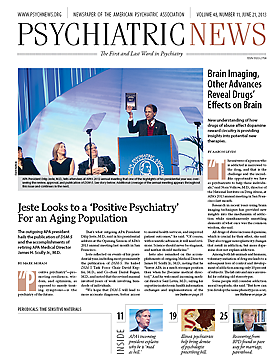For most medical students, the clerkship in psychiatry is their first, and often only, exposure to clinical psychiatry. Their clerkship experience can be considerably enhanced through collaborative teaching and learning with psychiatry residents.
Although students are expected to acquire knowledge about diagnosing and treating mental illnesses, certain experiences on the rotation may broaden their understanding of how to practice medicine in general. Students can encounter patients at different clinical sites, with different illness presentations, or in need of different treatments (despite having the same diagnosis). Students witness the effects of physical and socioeconomic environments on the course of mental illness, and they learn about the influence of mental illness on the treatment and outcome of comorbid physical illnesses.
Residents have the unique opportunity to enrich students’ experiences on the rotation because they work so closely with them.
Both during and after the rotation, residents may serve as mentors for students who are interested in a career in psychiatry. In addition to teaching rotation objectives or supervising clinical performance, residents can enrich students’ experiences by displaying empathy, modeling professionalism, demonstrating basic psychotherapy techniques, encouraging self-reflection, and sharing the importance of a meaningful doctor-patient relationship, as noted by Michael Ascher, M.D., and Jonathan Avery, M.D., in their October 19, 2012, Psychiatric News column.
A decline in empathy in medical students from matriculation to graduation was described in a study by Hojat and colleagues in Academic Medicine in 2009. But the clinical rotation can be an opportunity for residents to attenuate, arrest, or even reverse this trend. During that time, students can develop genuine empathy by observing residents’ interactions with patients and with the students themselves. Resident behavior can make a significant and lasting impression on medical students. Therefore, when residents demonstrate active listening, respect, and professionalism during interactions with families, nurses, treatment team members, and other physicians, nonverbal teaching occurs that can create a positive and lasting impact on a student’s professional development.
Regardless of the clinical rotation site, residents can educate students about the importance of psychotherapy in alleviating symptoms. They can offer instruction in basic techniques, such as motivational interviewing or identifying cognitive distortions. Students may develop countertransference toward patients or witness patients using a variety of defenses. In these cases, residents can encourage students to reflect and identify these feelings or defenses. This insight can serve as a tool for providing consistent, empathic care for future patients.
The rotation is also an opportunity to underscore the significance of the doctor-patient relationship and its uniquely therapeutic role in psychiatry. Students can recognize the reward of developing meaningful relationships with patients and the importance of treating a patient and not merely an illness.
Also, little emphasis has traditionally been given to teaching medical students how to teach. But in a short time, these students will find themselves in teaching roles as residents. Both the positive and negative interactions they experience with residents, including manner of teaching, will no doubt shape their professional personae and teaching styles. The interaction between resident and student might be compared to the functioning of a sled-dog team. Little is accomplished when one member is domineering toward or feeling downtrodden by the other, nor is much achieved when one team member is behind pushing or in front pulling. Even less is accomplished if the two individuals are pulling in opposite directions. Instead, an environment of mutual respect, in which resident and student are collaborating beside each other, is most conducive for students to acquire knowledge and hone their interpersonal skills.
Contact with students has deeply enriched my residency experience by giving me an opportunity to learn from the very students whom I teach. Whether they ask stimulating questions, reinforce pertinent topics from other fields of medicine, or share new developments in psychiatry, students give me inspiration to learn anew and help me maintain my commitment to lifelong learning. Furthermore, their curiosity, altruism, humor, and compassion remind me of the “complete” physician that I aspire to be. This makes me pause to appreciate the art, humanity, and reward of practicing medicine. The psychiatry rotation can indeed be an enriching experience for students and residents alike. ■

